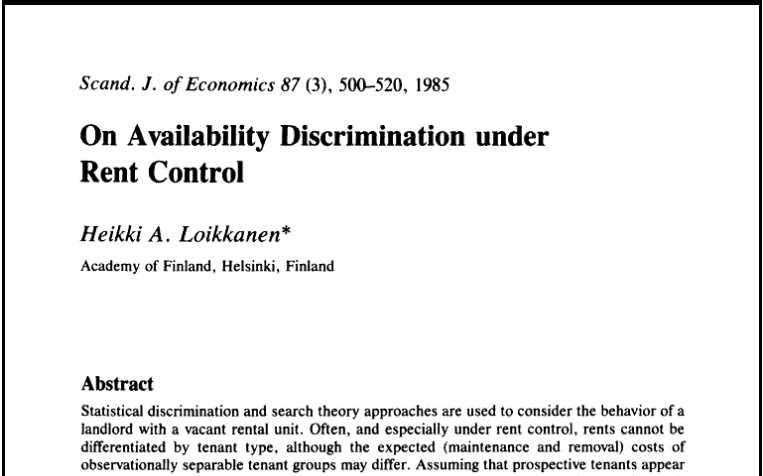Why Was Cambridge’s Rent Control Racist? Why Would Boston’s Be the Same?
| . Posted in News - 0 Comments
The mayor of Boston proposes to prohibit landlords from increasing rent by the rate of inflation. Furthermore, the mayor proposes to restrict the means by which landlords may recover possession of a rented dwelling unit (so-called “just cause eviction”). The two together would effect a form of rent control that we have already tried in Massachusetts.

The cover of the 1985 paper that predicted discrimination and disparate impact under rent control. One conclusion of this paper was supported by data from David Sims in 2007 studying Cambridge. Fair Use.
Massachusetts had rent control in some communities for roughly 25 years. Housing providers hated it for many reasons and worked to repeal it. We repealed rent control in 1994. Economists have since studied Massachusetts as a “natural experiment” on whether rent control is good or bad. We now know what landlords in 1994 could not have known: Rent control is bad for its racist disparate impact.
Proponents of rent control argue that rent control will prevent renters, especially renters of color, from being displaced. This is true, in the sense that rent control helps anyone who has an apartment the day the law is passed. There are studies and research on this. The anti-displacement picture is clear. But this is not the whole picture.
The problem becomes visible when we consider applicants for new housing over decades of a rent control regime. We know from researching Massachusetts’ own history that rent control hurts applicants of color far in excess of any transient stabilization benefit.
In 2007, David Sims, Economics Department at Brigham Young University, published “Out of control: What can we learn from the end of Massachusetts rent control?”, J. Urban. Econ. 61 (2007) 129-151. Among many other findings, this one stands out:
Only 8% of renters of color occupied rent controlled units, even though 22% of the residents in those cities were residents of color. There was a clear adverse disparate impact against renters of color during rent control.
The adverse disparate impact was caused by rent control. The Economist magazine further studied the situation. In the article “Rent Control: The Morning After,” the Economist showed that when rent control was repealed, the number of people of color in formerly controlled housing doubled to be more equal to what you'd expect based on the city population.
What was going on?
Normally, landlords can increase rent to offset perception of risk, including credit, income and criminal history, for marginal applicants. Under rent control, especially with just cause eviction, landlords hold units vacant longer waiting for applicants with high credit, high income and no history of minor criminal record. Such applicants will tend to be disproportionately and unfairly white. There is a Black–white wealth gap, and much more systemic racism, that disadvantages people of color on rental applications. There doesn’t need to be any personal racism at all for systemic racism to appear.
In America, and in Boston, no less, we have long had a Black–white wealth gap and rental-application gap.
- The Economic Policy Institute shows the 2018 median household income was $41,692 for Black households and $70,642 for white households.
- ApartmentList shows Black households are twice as likely to be evicted as white households.
- The Urban Institute shows 21% of Black households have a FICO credit score above 700, whereas 50% of white households do.
- A report from the Sentencing Project shows Black Americans constitute 53% of drug convictions, despite representing 14% of drug users.
Rent control and just cause eviction together drive landlords toward tougher screening metrics. And the numbers in America, and in Massachusetts, no less, differ unfairly by race.
Despite strong protections against personal discrimination, rent control worsens systemic racism.
This work builds on extensive research in this field, including Heikki Loikkanen’s “On Availability Discrimination under Rent Control,” Scan. J. Econ., Sep., 1985, Vol. 87, No. 3, pp. 500–520. Loikkanen gives us the ability to predict exactly how much systemic racism will result from rent control. The answer is bad for all rent control proposals, mitigated only to the extent rent control is curbed or restricted. We might as well not have it.
With the data available publicly, any rent control system would be immediately challengeable under Title VIII of the federal Civil Rights Act of 1968 (the Fair Housing Act). It doesn’t matter which buildings are exempt or not, or whether the allowable rent increase is above or below CPI. These refinements are the proverbial rearranged deck chairs on the Titanic. Rent control is not a solution on any scale. To allow only a little rent control in just one town hurts everyone in all towns: It reduces supply there, drives people out of town and makes housing more expensive everywhere else. Plus, as Dr. King wrote from jail, “Injustice anywhere is a threat to justice everywhere.” We must work diligently to eliminate systemic racism in Massachusetts and to correct the housing market by statewide – not local – action. The legislature and the courts will not allow Boston so-called “local choice.”
Rent control helps only those who have an apartment the moment the law is passed. It hurts everyone else forever after.




